UN Global Plastics Treaty
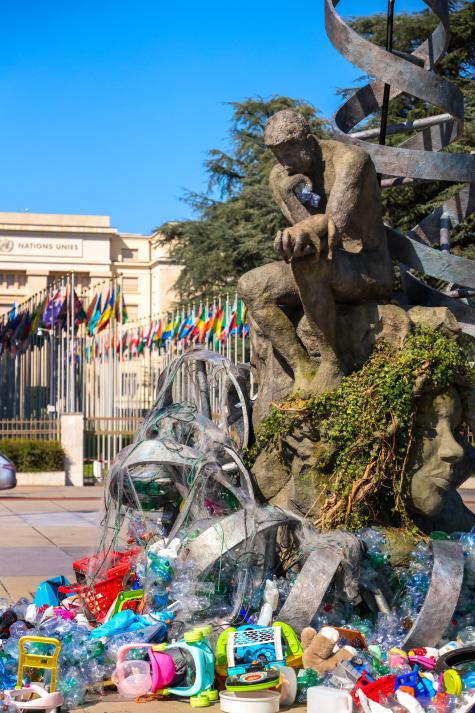
➡️ UN GLOBAL PLASTICS TREATY – Humanity vs the Plastics/Fossil Fuel Industry
The UN Global Plastics Treaty will be a legally binding international agreement to end plastic pollution. It was first proposed in March 2022 when 175 nations signed a resolution at the United Nations Environment Assembly committing to draft the treaty. Negotiations have, however, been stalled by disagreements for years.
The final round of negotiations (INC-5.2) took place 5–14 August 2025 in Geneva, Switzerland. Key goals include minimising plastic production, enhancing recycling efforts, and encouraging the development of alternative materials such as bioplastic.
In a 2016 report by the WEF, at current rates, it is predicted that without a solution, "oceans will contain more plastic than fish by 2050". Plastics production has increased twentyfold since 1964, and now 360 million metric tons of plastic waste is created every single year. Just 9% of this is recycled effectively. One third will end up in fragile ecosystems such as the world's oceans. Plastic production is set to triple by 2060.
Jump straight to our resources on the ➡️ Global Plastics Treaty
Explore our comprehensive guides on -
-
The Plastics & Food Industry
-
Ocean Plastics Pollution
-
Failed Negotiations Before the December 2024 Deadline
-
Renewed Momentum in 2025
-
Corporate Lobbying at the Plastic Treaty Negotiations
This treaty is our greatest chance to address the huge issue of plastic pollution on a global scale across its entire lifecycle, from production to disposal.
Please share our posts on this in-depth resource via Twitter, Bluesky, Facebook, Instagram, and LinkedIn
We published an article on this topic with CommonDreams
Provisions which are under negotiation include -
-
Reducing the production and consumption of primary plastic polymers to sustainable levels.
-
Eliminating and restricting unnecessary, avoidable or problematic plastics, chemicals and products.
-
Improving global waste management - Eliminating the release of plastics into nature.
-
Ending plastic injustice and facilitating a just transition for affected communities.
-
A requirement for parties to report on their production, imports and exports of primary plastic polymers.
-
Improved ways to recycle plastic and a vast expansion of recycling schemes globally.
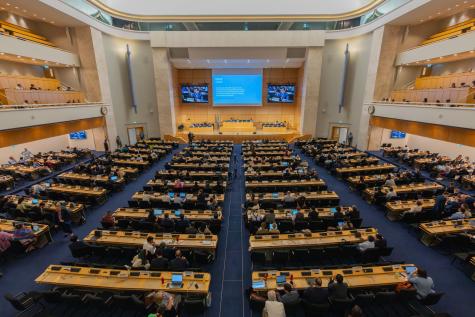
Geneva – Last Chance for a Strong Treaty?
United Nations negotiations work on a consensus basis. All of the participating countries (over 170) must agree to the terms before approval. Resistance from even a small minority can block the deal.
There have so far been nine rounds of talks, none of which have resulted in a consensus. The main point of contention is the inclusion of mandatory caps on plastic production.
Oil and gas-producing countries such as Saudi Arabia, Russia, and Iran have been stalling progress, as they oppose production targets and prefer to focus on waste management.
Unsurprisingly, under the presidency of Trump, the U.S. has been heavily involved in encouraging nations to reject the plastic production limits.
August 14th is the deadline for parties to deliver, but progress has been painfully slow. After 3 years, there are still many unresolved issues as countries struggle to see common ground.
Panama's negotiator, Juan Monterrey Gomez, blasted those attempting to block the deal - "we cannot recycle our way out of this crisis... when the poison is inside us."
Countries which are pushing for a high ambition treaty include Canada, Rwanda, Norway, Germany, UK, France, Japan, and Kenya. Stay tuned for further updates.
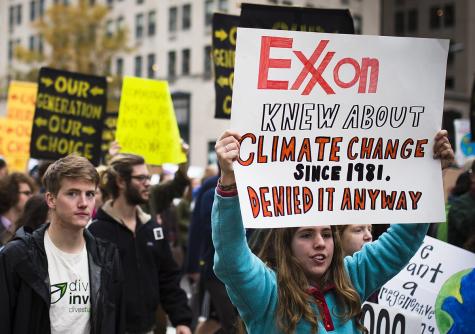
Greenwashing & Lobbying
Corporate greenwashing has been used for decades to distract the public from the reality of dirty business, allowing industries to continue operating with impunity. Carbon offsets and recycling are being pushed as solutions to the plastics crisis as a way to continue plastic production unabated.
Climate denial and the withholding of key scientific findings have allowed Big Oil to continue upscaling fossil fuel operations. Companies such as ExxonMobil, Shell, and BP have kept this dirty secret since the 1970s, long before the public was made aware of the consequences of unchecked fossil fuel energy production.
The plastics crisis and the climate crisis are inextricably linked as synthetic plastics are derived from crude oil, natural gas or coal. The transition away from fossil fuels in the energy sector has led many fossil fuel companies to shift their attention to the plastics industry, building new manufacturing sites and ramping up production. As such, fossil fuel companies have very much been part of the plastic treaty delegations.
The 2024 Busan talks saw the fossil fuel lobby secure record access, allowing them to implement well-honed tactics of persuasion, including obstruction, distraction, and the spread of misinformation. Representatives from ExxonMobil, Dow, BASF and Sabic all had participants in the lobby, which made up almost 6% of registered attendees – greater than the number of Indigenous representatives.
This is not the first time the fossil fuel lobby has exerted its weight on United Nations negotiations. Their long-standing presence at the COP Climate Conferences has drawn much criticism from scientists, experts, and activists who slam their involvement and have lost faith in the ability of COP to follow through.
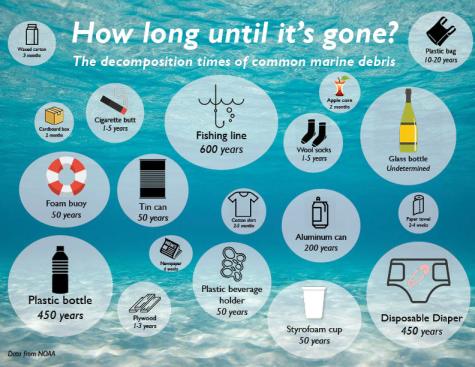
At the 2024 COP29 summit in Baku, 1,800 fossil fuel lobbyists were granted access – more than the delegates of the 10 most climate-vulnerable countries combined.
Protesters led by Greenpeace and other environmental advocacy groups have gathered in Geneva to demand a strong treaty, declaring "the Global Plastics Treaty is Not For Sale". They are demanding an end to the influence of petrochemical giants in the negotiations.
Why Do We Need a Plastics Treaty?
Plastic poses a severe threat to our health, our environment, and the economy. Eight billion tonnes of plastic is now polluting the entire planet, from the highest mountain to the deepest ocean trench.
-
HEALTH -
More than 16,000 chemicals are used in plastics, many of which are toxic and have been linked to health effects such as cancer, hormonal disruption, and reproductive issues. Foetuses, infants and young children are the most vulnerable to these associated harms. Birth defects, impaired lung growth, and childhood cancer have all been reported.
Plastic breaks down into microplastics. In a recent study, microplastics were found in the blood of 80% of people tested. It enters the body through water, food and breathing. Microplastic particles have also been found in the brain, breast milk, placentas, semen and bone marrow. Over one in three fish caught for human consumption now contains plastic.
-
ENVIRONMENT -
Approximately 11 million tonnes of plastic enters our oceans every year. More than 100,000 marine animals and 1 million birds are killed by marine plastic pollution every year.
On land, plastic pollution impacts soil health and biodiversity. Microplastics can alter soil structure, reduce water retention, and stunt plant growth. Plastic contaminates crops and livestock, which is how it enters our food chain.
Plastic pollution also disrupts habitats and the animal food chain, threatening the survival of species and resulting in widespread biodiversity loss.
Over 99% of plastics are made from fossil fuels. Plastic pollution dramatically reduces air quality through the release of harmful chemicals during production and the open burning of plastic waste. The production of just 1 tonne of plastic generates 2.5 tonnes of carbon dioxide.
If production continues at such a massive rate, by 2040, plastic production will generate the same amount of greenhouse gases as 615 coal power stations.
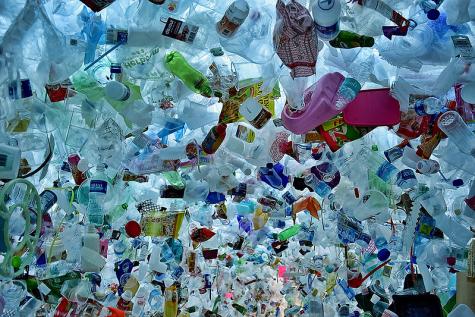
-
ECONOMY -
Plastic pollution is expensive! In 2024, the social and environmental cost was estimated at $300 – 460 billion per year - the cost is 10 times higher for low-income countries despite consuming much less plastic.
Degraded natural environments significantly harm the tourism industry through loss of tourism revenue, reduced tourist appeal, and impact on local economies. Polluted beaches and water are among the biggest issues, costing tourism-dependent economies billions of dollars every year in lost revenue and cleanup costs.
Once seen as a cheap material, scientists now argue that the long-term cost of plastic makes it incredibly expensive. The Ellen MacArthur Foundation estimates that a cleanup cost of $150 billion is needed to address plastic pollution in the oceans alone.
Gross domestic product (GDP) losses from marine plastic pollution have been estimated at $7 billion for the year 2018. Waste from the fishing industry is the deadliest form of marine plastic. Approximately 640,000 tonnes of plastic from fishing gear enters the ocean every year.
The economic losses from plastic pollution are substantial, far-reaching, and difficult to quantify. The tourism, fishing, and agricultural industries are the most seriously affected. They are also ironically some of the biggest contributors.
Other expenses include waste management, healthcare, and environmental restoration. The social costs are even higher as the plastics crisis is now hindering progress towards the global sustainable development goals.
Thinker's Burden
Artist Benjamin Von Wong created a beautiful piece of art related to plastic waste in front to the Palais des Nations in Geneva. A symbol for the INC5.2 Global Plastic Pollution Treaty negotiations. Read more here and see an interesting dance performance here.
"Plastic pollution knows no borders, and no country can solve this crisis on their own" - WWF.
Author: Rachael Mellor, 14.08.25 licensed under CC BY-SA 4.0 - Work in progress; please check back on Monday for updates ;-)
For further reading on the UN Global Plastics Treaty see below ⬇️